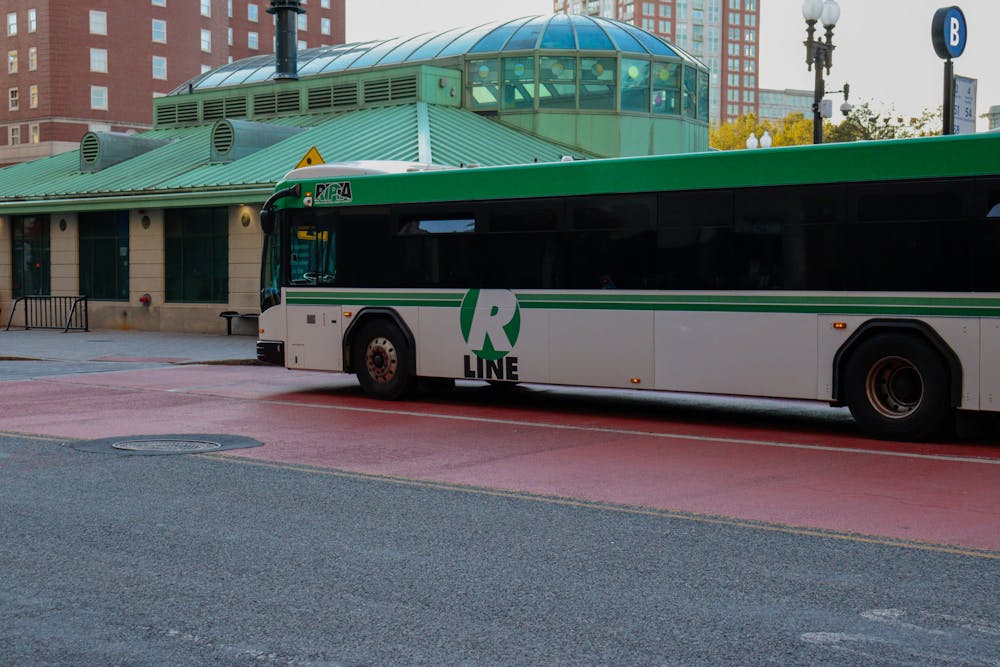The Rhode Island Public Transit Authority recently concluded a 13-month pilot program to offer free rides to all passengers on the R-line, which runs from Cranston to Pawtucket through downtown Providence.
For much of this period, RIPTA has also piloted a No Fare Bus Pass Program, offering free rides to passengers who meet the income threshold to receive a no fare bus pass but not other required criteria.
As the two programs end, RIPTA draws closer to an annual funding gap of $40 million when federal relief funds are exhausted. If the agency is not fully funded by the 2025 fiscal year, a RIPTA presentation to the state Senate predicts over 400 layoffs and the elimination of multiple bus lines.
End of R-Line pilot
In 2022, the Rhode Island General Assembly allocated $2.5 million in American Rescue Plan Act funds to RIPTA to fund a year-long fare-free pilot program for all riders on the R-Line. But RIPTA Director of Communications and Public Outreach Cristy Raposo Perry noted that the cost of the pilot program exceeded the allocation.
“Given the annual cost of this pilot and RIPTA’s current budget outlook, it is not financially feasible for RIPTA to continue this program indefinitely,” Perry wrote in an email to The Herald.
A quarterly report on the program, which tracked R-Line ridership from December 2022 to February 2023, noted that RIPTA would have earned about $400,000 each month if R-Line riders had paid the $2 bus fare. According to Perry, the total lost revenue was $5.7 million.
On Monday, riders and activists gathered in front of the Rhode Island State House to rally for increased RIPTA funding. The rally centered around four main objectives, according to Dally Dixon, an organizer and junior at Rhode Island College.
“The main demands are increased state and federal funding, reinstating the free R-Line, better pay for bus operators and preventing the fiscal cliff,” Dixon said.
Monday’s rally was also endorsed by Rhode Island Transit Riders. Amy Glidden, co-coordinator of the group, said she has a particular interest in the R-Line fare-free program due to the new riders the pilot brought in.
While Glidden also supports the no fare pass pilot program, she hopes to see an extension of the transit system itself.
“Rhode Island Riders would like to see free fares exist in a fully funded system that has the resources to expand as well,” Glidden said. She added that there are “new organizing efforts” to expand the transit system.
Crowley added that he suspects there will be decreased ridership following the discontinuation of the fare-free R-Line program.
In response, Perry cited the financial situation of the transit agency and the cost of the pilot program. She added that while ridership increased during the pilot program, an increased number of passengers were using the R-Line as a hop-on, hop-off service for shorter trips.
RIPTA will aim to fully evaluate R-Line ridership in their board meeting at the end of October.
No fare bus pass program
The no fare bus pass program, which began in November 2022, was extended until the end of October while the RIPTA board of directors waits for administrators to determine if the program can continue, according to Patrick Crowley, a member of the authority’s board of directors.
At a September board meeting, Sarah Ingle, RIPTA’s director of long range planning, said that the agency lacks funding to continue the pilot program past the end of October.
When RIPTA first began its no fare bus pass program for low-income community members, dozens came to the Mathewson Street Church where the passes were being distributed, The Herald previously reported
While assisting with this initiative, church Director of Outreach and Communications Kevin Simon said the program was able to help community members who were not able to reach doctor’s appointments, family members or meals.
Over the course of the pilot, RIPTA has issued 775 passes, but, according to Simon, “people come to the door who still need passes.”
“It’s back to hearing stories of 'I can't get to my doctor’s appointment,’” Simon said. “The need is not going away.”
Simon and 15 service providers met with five members of the RIPTA staff last week to discuss the future of the pilot program.
“RIPTA has been incredibly supportive,” Simon said. Along with a team of service providers, Simon hopes to present a plan to replace the no fare pilot program by the end of the month.
Crowley is similarly hopeful that RIPTA will be able to provide a form of subsidized passes. “I’m optimistic that we can figure out some way to make the program continue,” he said.
But Simon noted that the transit authority must go further in the future: “It’s not just an extension that we need,” he said, “but an expansion.”

Hadley Carr is the senior editor of digital product and technology of The Herald's 136th Editorial Board.





